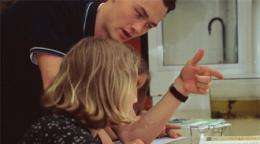In learning to read and write, dialogue important

“The ability to read and write in different subjects is of great importance for future choices in life. What is needed is highly distinct instruction and dialogues in the schools in order for children to learn to deal with different types of texts,” says Caroline Liberg, who is a professor of educational sciences at the Uppsala University’s new Blasenhus Campus and conducts research on reading and writing processes.
Learning to read and write is not just a matter of “cracking the writing code.” It is also about being able to use it to read and write in a number of subjects and contexts.
“Even at a very early age the foundation is laid for children’s understanding and future involvement, when grown-ups enter the text together with children, elaborating on and explaining the content,” says Caroline Liberg.
In an international perspective, Swedish families do very well when it comes to providing young children with a stimulating home environment for developing written language. In the next step the children themselves learn to read and write and understand the abstract principles of written letters. This is where the focus lies in today’s schools.
“But once a child has developed the basic ability to read and write, a new challenge looms. The child will encounter a deluge of texts in the third or fourth year of school, if not earlier. To many students this can be a real shock, since the information in the texts is so dense,” says Caroline Liberg.
Students are usually left on their own to deal with this phase, facing huge amounts of text with no real support from teachers. The trend in education since the 1980s has been to let children manage this by themselves.
“But interaction with others and dialogue are extremely important for learning. They introduce different perspectives on the content. The contrast effect is the foundation of all learning. Different subject-matter texts also present different difficulties. For example, a text in physics is often explanatory, whereas other texts may be narrative, argumentative, etc. Students need to learn to encounter all of these texts on the terms represented by the learning demands of the respective subjects.”
“At Uppsala University we have recently been given a grant to establish a research school to study texts in mathematics and science and how students cope with these texts. These are fundamental issues when it comes to understanding how they develop a knowledge of these subject areas,” maintains Caroline Liberg.
Provided by Uppsala University


















